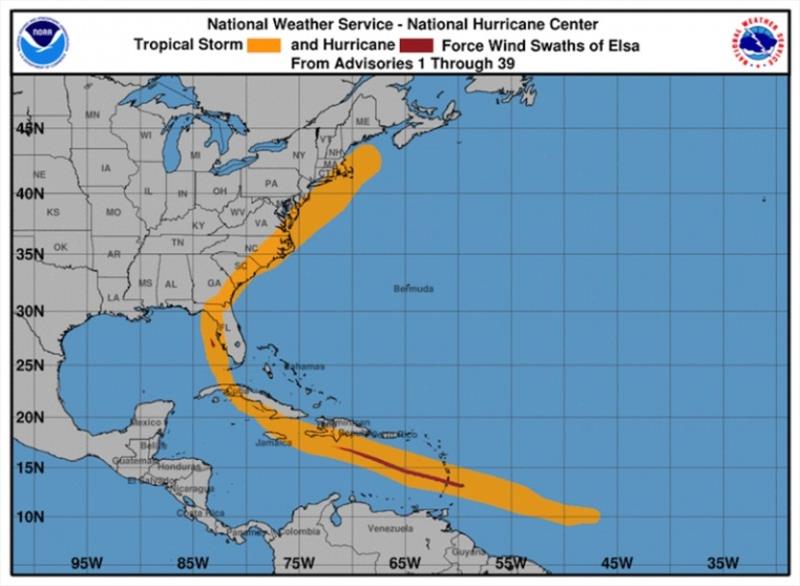
2021 hurricane season update from the North
by Noonsite 31 Jul 2021 15:12 UTC

Tropical storm Elsa formed in the west Atlantic © Noonsite
The first tropical storms of the 2021 hurricane season began forming in the Caribbean basin this month.
At the start of July, tropical storm Elsa formed in the west Atlantic and headed rapidly towards the windward islands and through to the Caymans, leaving a trail of mainly flood damage in its wake. Elsa became the first hurricane of the 2021 Atlantic hurricane season on July 2, almost six weeks earlier than the average date of the season's first Atlantic hurricane. The next hurricane to form this season will be called Fred.
On August 4th at noon eastern, the National Hurricane Center will be hosting their second annual live webinar on weather forecasting geared toward blue water mariners. These are free and their are 250 slots available. To sign up, register online here.
Entry into the USA has been greatly eased by the introduction of the CBP ROAM Application, providing face-to-face reporting with a CBP officer via smart phone. The transition from ROAM to CBP One™, which was scheduled for July 2021, has now been postponed to late 2021 - early 2022. However, new ROAM features will be released in August 2021, including applying for a cruising license and reporting domestic ports of call.
Orca activity continues to be of concern off the Spanish/Portuguese Atlantic coasts and although it is still only July, interactions are intensifying. ARC Europe boat MAKA encountered Orcas two hours away from Gibraltar in early July, suffering extensive rudder damage (see photo and video link at the bottom of this report here).
ARC boat Scat Cat was towed into Barbate just last week after being rammed by a pod of Orcas off Tarifa, SW Spain. Scat Cat report that seven yachts have been intercepted by Orcas in that area in the last seven days. Pods have also recently been sighted off Vigo, Galicia (NW Spain) and further north off France in the Bay of Biscay.
Refer to the Atlantic Orca Working Group webpage for information about interactions and the safety protocol developed by the working group. They recommend that if Orcas start to touch the boat, the first thing to do is to stop the boat (even lower the sails) and turn off the autopilot, then follow the steps of the safety protocol.
Migrant activity is also causing concern in both the Med and in UK waters. Guy Taylor who has just returned to the UK from cruising the Med, reports on his experience off the coast of Southern Spain where he and his crew encountered the harsh reality of the plight of desperate migrants trying to cross from Africa to Europe.
It may be the height of Summer in the Mediterranean right now, but many skippers' thoughts are turning to where to spend the winter. Get some inspiration and ideas from our Wintering in the Mediterranean report, a compilation of feedback and recommendations from Noonsite users who have done just that.
This article has been provided by the courtesy of noonsite.com.